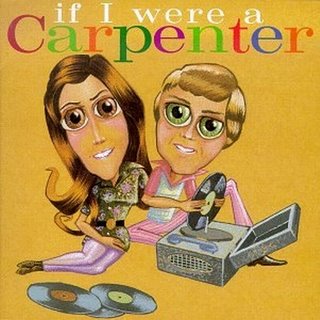Unfortunately, I don’t think this is going to be a very long article, since I’m not going to dig into the history of the Carpenters themselves. They were active before my time– I was 18 months old when Karen Carpenter died– and much has already been written about how their sunny soft-rock style often masked the pain and sadness of their lyrics, to say nothing of the darkness off the record and Karen’s demons.
The question for this album is: Is it worth making an album that gives a bunch of artists a chance to explore that darkness more directly, to cover these songs in their own distinct style?
I think so.
It’s fascinating to see the mix of artists represented on the album, a cross-section of alternative rock of 1994 that intersects in a way you’d probably only find on this album. It’s a selection of Gen-X college rock staples (Cracker, Matthew Sweet, Grant Lee Buffalo), one-hit wonders past (4 Non Blondes) and future (Dishwalla), permanent underground staples (American Music Club, Redd Kross), godfathers of indie rock (Sonic Youth), mainstream alt-rock successes (The Cranberries), and even future superstars. (Sheryl Crow! Fun fact, this album was released less than six months after “All I Wanna Do” was released as a single and became a smash hit, leading Crow’s rocket rise to stardom.)
For that alone, this album would be worth listening as a curio. For my money, though, it’s quite good, and I want to highlight some of my favorite tracks on here.
American Music Club’s brand of deep, alcoholic depression kicks off the album in appropriate style with “Goodbye to Love,” Mark Eitzel’s vocals matching the lyrics for the despair of loneliness. Their counterpart lies in two of the more chipper tracks on the album, Shonen Knife’s take on “Top of the World” and the Cranberries performing “Close to You.”
Among these early track is one of the more famous takes of the album, Sonic Youth’s bleak nighttime space-walk through “Superstar.” It’s pretty good, and certainly a unique offering on the album, although apparently Richard Carpenter didn’t care for it.
For my money, the mid-section of the album is its best. Track six is Dishwalla’s take on “It’s Going to Take Some Time,” a song originally written by Carole King. Dishwalla’s performance, for me, adds the right amount of melancholy and resolve to a song about looking back at a regret, probably an ended relationship, and vowing to learn, be patient, and do better. “So it’s one more round for experience / And I’m on the road again…”
That’s followed by Sheryl Crow’s “Solitaire,” a performance whose spareness in arrangement underlines the heartbreaking loneliness pervasive throughout. It is, as well, a top track from this album, one that I would elaborate on more except that I don’t particularly think I could tell you anything that you wouldn’t better get from just listening to it.
Of course, one of the standout voices on the track is Concrete Blonde’s Johnette Napolitano, teaming up with Marc Moreland again for a cover of “Hurting Each Other,” and, as often with anything Napolitano touches, her voice elevates the material, in this case communicating the pain and anguish that Karen and Richard Carpenter’s arrangements and voices often glossed over. (No surprise that she could do this with Moreland, a longtime creative and personal partner– the subject of Concrete Blonde’s “Joey”– and someone whose alcoholism consumed him in the end.)
That stretch of three tracks is my favorite, but the rest of the album is pretty good too. Redd Kross does a strong turn on “Yesterday Once More,” which has a nostalgic streak to its lyrics but isn’t really as sad as so many of the other songs, and I’ve always enjoyed it just as a sincere appreciation of someone looking back at the way music made them feel when they were younger, a sentiment I relate to easily.
Babes in Toyland follow that with a kinda funky, fuzzy version of “Calling Occupants of Interplanetary Craft,” which is a pretty oddball song in the Carpenters catalog to begin with.
I didn’t touch on every track on this album– Cracker’s bleak “Rainy Days and Mondays,” Matthew Sweet’s gentle “Let Me Be the One” are also good cuts, and closing on Grant Lee Buffalo’s “We’ve Only Just Begun” is a strong choice– but in the interest of turning out something at all, I wanted to hit on the songs that were highlights to me and that I wanted to share with you.
This album isn’t going to blow your mind, but I wanted to draw attention to it because it was an important part of my adolescence and seems to have been stuck in some long-forgotten dusty corner of history, a mere curiosity of the era. I think it’s pretty darn good on its own merits. Check it out.

